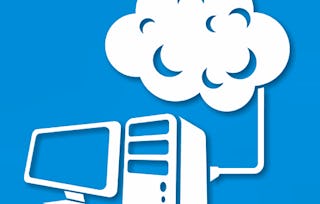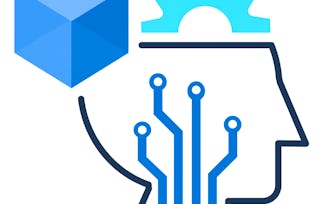Dieser Kurs führt Sie in die Konzepte der Künstlichen Intelligenz und des maschinellen Lernens ein. Wir besprechen Arten und Aufgaben des maschinellen Lernens und Algorithmen des maschinellen Lernens. Sie lernen Python als beliebte Programmiersprache für Lösungen zum maschinellen Lernen kennen, einschließlich der Verwendung einiger wissenschaftlicher Ökosystem-Pakete, die Ihnen bei der Implementierung des maschinellen Lernens helfen.

Entwicklung von KI-Anwendungen auf Azure

Entwicklung von KI-Anwendungen auf Azure
Dieser Kurs ist Teil von Spezialisierung „Microsoft Azure: KI, Infrastruktur und Datenlösungen“


Dozenten: Ronald J. Daskevich, DCS
48.792 bereits angemeldet
Bei enthalten
978 Bewertungen
Empfohlene Erfahrung
Was Sie lernen werden
Definieren Sie Künstliche Intelligenz und Maschinensprache
Beschreiben Sie KI-Tools und Rollen sowie den Microsoft Team Data Science Prozess
Arbeiten Sie mit Azure-APIs, einschließlich derer für Vision, Sprache und Suche
Erstellen, trainieren, testen und verteilen Sie Ihr KI-Modell in der Cloud
Kompetenzen, die Sie erwerben
- Kategorie: Algorithmen für maschinelles Lernen
- Kategorie: Computervision
- Kategorie: Bildanalyse
- Kategorie: Verarbeitung natürlicher Sprache
- Kategorie: Datenverarbeitung
- Kategorie: Modell-Bereitstellung
- Kategorie: Künstliche Intelligenz und Maschinelles Lernen (KI/ML)
- Kategorie: Microsoft Azure
- Kategorie: Python-Programmierung
- Kategorie: Schnittstelle zur Anwendungsprogrammierung (API)
- Kategorie: Maschinelles Lernen
- Der Fähigkeiten-Abschnitt ist eingeklappt. 6 von 11 Fähigkeiten werden angezeigt.
Wichtige Details

Zu Ihrem LinkedIn-Profil hinzufügen
19 Aufgaben
Erfahren Sie, wie Mitarbeiter führender Unternehmen gefragte Kompetenzen erwerben.

Erweitern Sie Ihre Fachkenntnisse
- Lernen Sie neue Konzepte von Branchenexperten
- Gewinnen Sie ein Grundverständnis bestimmter Themen oder Tools
- Erwerben Sie berufsrelevante Kompetenzen durch praktische Projekte
- Erwerben Sie ein Berufszertifikat zur Vorlage

In diesem Kurs gibt es 5 Module
In diesem Modul werden künstliche Intelligenz und maschinelles Lernen vorgestellt. Als nächstes sprechen wir über Arten und Aufgaben des maschinellen Lernens. Dies führt zu einer Diskussion über Algorithmen für maschinelles Lernen. Schließlich erkunden wir Python als beliebte Sprache für maschinelles Lernen und stellen einige wissenschaftliche Ökosystem-Pakete vor, die Ihnen bei der Implementierung von maschinellem Lernen helfen werden. Am Ende dieser Lektion werden Sie in der Lage sein, Modelle für maschinelles Lernen in mindestens einer der verfügbaren Python-Bibliotheken für maschinelles Lernen zu implementieren.
Das ist alles enthalten
10 Videos6 Lektüren4 Aufgaben1 Diskussionsthema
In diesem Modul werden die in Microsoft Azure verfügbaren Tools für maschinelles Lernen vorgestellt. Es befasst sich dann mit standardisierten Ansätzen, die entwickelt wurden, um Datenanalyseprojekte zum Erfolg zu führen. Schließlich erhalten Sie eine konkrete Anleitung für den Team Data Science-Ansatz von Microsoft, der die Rollen und Aufgaben im Rahmen dieses Prozesses umfasst. Die Übung am Ende dieser Lektion verweist Sie auf die Dokumentation von Microsoft, um diesen Prozess in ihrer DevOps-Lösung zu implementieren, falls Sie noch keine eigene haben.
Das ist alles enthalten
9 Videos2 Lektüren3 Aufgaben1 Diskussionsthema
Dieses Modul führt Sie in die vortrainierten und verwalteten maschinellen Lernverfahren von Microsoft ein, die als REST-APIs in der Suite der kognitiven Dienste angeboten werden. Wir implementieren insbesondere Lösungen, die die Computer Vision API und die Gesichtserkennungs-API verwenden, und führen eine Stimmungsanalyse durch, indem wir den Dienst für natürliche Sprache aufrufen.
Das ist alles enthalten
7 Videos3 Lektüren3 Aufgaben1 Diskussionsthema
Dieses Modul macht Sie mit den Möglichkeiten des Azure Machine Learning Service vertraut. Wir untersuchen, wie Sie einen ML-Arbeitsbereich erstellen und referenzieren. Anschließend sprechen wir darüber, wie Sie mit dem Azure ML Service ein Machine Learning-Modell trainieren. Wir sprechen über den Zweck und die Rolle von Experimenten, Läufen und Modellen. Schließlich sprechen wir über die Azure-Ressourcen, mit denen Sie Ihre Modelle für maschinelles Lernen trainieren können. Zu den Übungen in dieser Lektion gehören das Erstellen eines Arbeitsbereichs, das Erstellen eines Rechenziels und das Ausführen eines Trainingslaufs mit dem Azure ML Service.
Das ist alles enthalten
7 Videos3 Lektüren5 Aufgaben
In diesem Modul erfahren Sie, wie Sie eine Verbindung zu Ihrem Arbeitsbereich herstellen. Als nächstes besprechen wir, wie die Modellregistrierung funktioniert und wie Sie ein trainiertes Modell lokal und aus einem Trainingslauf im Arbeitsbereich registrieren. Darüber hinaus zeigen wir Ihnen die Schritte zur Vorbereitung eines Modells für die Bereitstellung, einschließlich der Identifizierung von Abhängigkeiten, der Konfiguration eines Bereitstellungsziels und der Erstellung eines Container-Images. Schließlich stellen wir ein trainiertes Modell als Webservice bereit und testen es, indem wir JSON-Objekte an die API senden.
Das ist alles enthalten
8 Videos1 Lektüre4 Aufgaben
Erwerben Sie ein Karrierezertifikat.
Fügen Sie dieses Zeugnis Ihrem LinkedIn-Profil, Lebenslauf oder CV hinzu. Teilen Sie sie in Social Media und in Ihrer Leistungsbeurteilung.
Dozenten


von
Mehr von Maschinelles Lernen entdecken
 Status: Kostenloser Testzeitraum
Status: Kostenloser Testzeitraum Status: Kostenloser Testzeitraum
Status: Kostenloser TestzeitraumMicrosoft
 Status: Kostenloser Testzeitraum
Status: Kostenloser Testzeitraum Status: Kostenloser Testzeitraum
Status: Kostenloser Testzeitraum
Warum entscheiden sich Menschen für Coursera für ihre Karriere?

Felipe M.

Jennifer J.

Larry W.

Chaitanya A.
Bewertungen von Lernenden
- 5 stars
65,43 %
- 4 stars
20,85 %
- 3 stars
8,28 %
- 2 stars
2,14 %
- 1 star
3,27 %
Zeigt 3 von 978 an
Geprüft am 3. Juni 2020
my basic is chemical engineering but i interested with AI, This courses help me to know about AI aplication on azure
Geprüft am 12. Juni 2020
There can be a project submission session where we have hands on experience in using the API's and also ML experiments
Geprüft am 5. Mai 2020
It was very fantastic course which can bulid the life students or people thank u very much 😍😘🥰🥰🥰

Neue Karrieremöglichkeiten mit Coursera Plus
Unbegrenzter Zugang zu 10,000+ Weltklasse-Kursen, praktischen Projekten und berufsqualifizierenden Zertifikatsprogrammen - alles in Ihrem Abonnement enthalten
Bringen Sie Ihre Karriere mit einem Online-Abschluss voran.
Erwerben Sie einen Abschluss von erstklassigen Universitäten – 100 % online
Schließen Sie sich mehr als 3.400 Unternehmen in aller Welt an, die sich für Coursera for Business entschieden haben.
Schulen Sie Ihre Mitarbeiter*innen, um sich in der digitalen Wirtschaft zu behaupten.
Häufig gestellte Fragen
Um Zugang zu den Kursmaterialien und Aufgaben zu erhalten und um ein Zertifikat zu erwerben, müssen Sie die Zertifikatserfahrung erwerben, wenn Sie sich für einen Kurs anmelden. Sie können stattdessen eine kostenlose Testversion ausprobieren oder finanzielle Unterstützung beantragen. Der Kurs kann stattdessen die Option "Vollständiger Kurs, kein Zertifikat" anbieten. Mit dieser Option können Sie alle Kursmaterialien einsehen, die erforderlichen Bewertungen abgeben und eine Abschlussnote erhalten. Dies bedeutet auch, dass Sie kein Zertifikat erwerben können.
Wenn Sie sich für den Kurs einschreiben, erhalten Sie Zugang zu allen Kursen der Spezialisierung, und Sie erhalten ein Zertifikat, wenn Sie die Arbeit abgeschlossen haben. Ihr elektronisches Zertifikat wird Ihrer Seite "Leistungen" hinzugefügt - von dort aus können Sie Ihr Zertifikat ausdrucken oder Ihrem LinkedIn-Profil hinzufügen.
Ja. Für ausgewählte Lernprogramme können Sie eine finanzielle Unterstützung oder ein Stipendium beantragen, wenn Sie die Anmeldungsgebühr nicht aufbringen können. Wenn für das von Ihnen gewählte Lernprogramm eine finanzielle Unterstützung oder ein Stipendium verfügbar ist, finden Sie auf der Beschreibungsseite einen Link zum Antragsformular.
Weitere Fragen
Finanzielle Unterstützung verfügbar,

